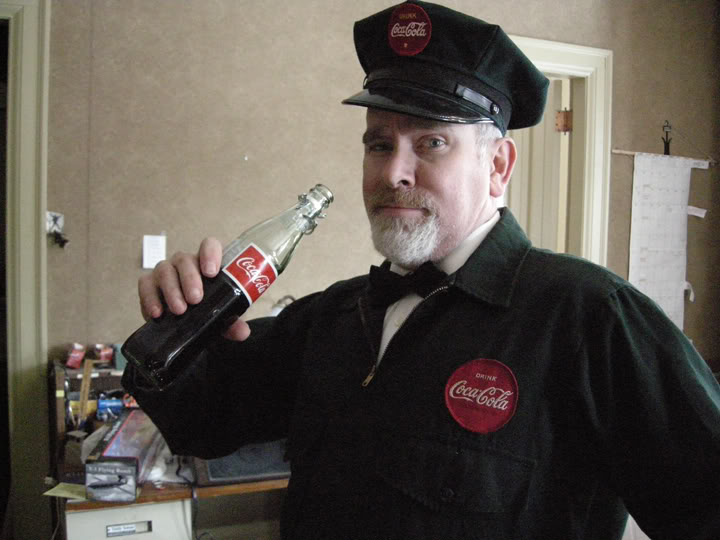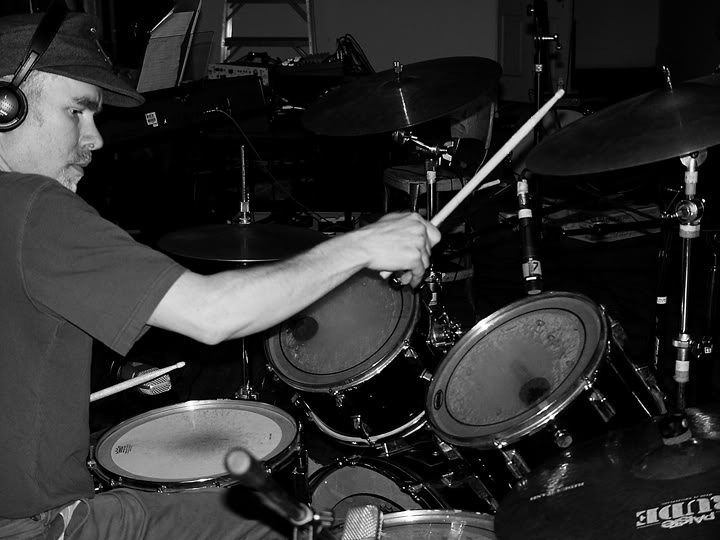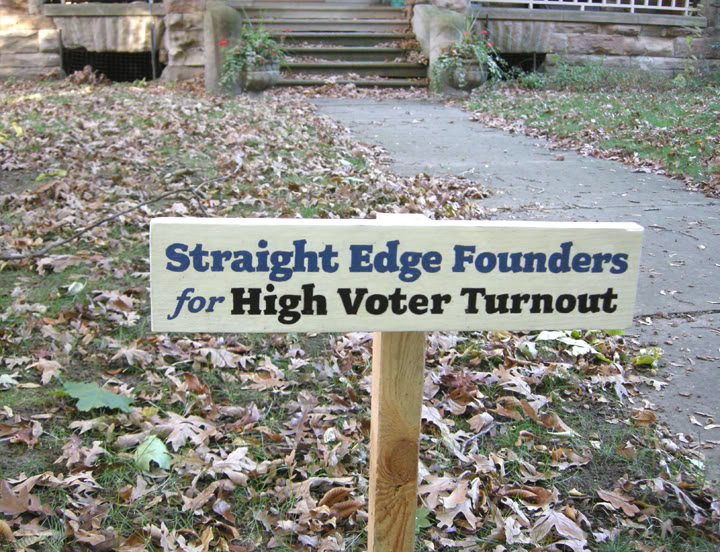

Of
Dischord Records
By Tyler Vile
If there
had to be just one band that made me believe in the D.I.Y. ethic, it
would be Minor Threat. Before that rock music seemed like this world
where only mythical beings from New York, California, and England could
make anything worth listening to. The Clash, The Ramones, and even
Operation Ivy had this sort of mystique to them. I thought: "Wow, these
were guys an hour and a half away from where I live doing this twenty
something years ago. It's way easier for me now, I could do this if I
really wanted." I never subscribed to Straight Edge ideas, but at
thirteen forming a band was easy because the Teen Idles did it. I had
the pleasure of talking to Dischord records co-owner about his own
label Adult Swim, his band Fast Piece of Furniture, music in general,
and more. Hope you enjoy!
Punk Globe:
Hey Jeff, thanks for agreeing to do this
interview. Please tell us a bit about yourself and your life now in
Ohio. Who or what persuaded you to move from DC?
Jeff Nelson: Well, I
guess there are two things I've been involved with that your readers
may have heard of. I played drums in the band Minor Threat in the early
'80s, I'm co-owner of Dischord Records with my friend Ian MacKaye, and
I am the owner of Adult Swim Records and Pedestrian Press. I've been a
graphic designer for years, and also love doing carpentry. I collect
way too many things, including Jeep Wagoneers. My obsession with
Wagoneers and old Jeep stuff and a long-time love of Victorian
architecture led me to move to Toledo, Ohio, five years ago (Toledo is
home
of Jeep, and there are a lot of nice, cheap Victorian houses here).
I
have a great many friends and connections in DC, and obviously Dischord
Records is still there, but I guess I really felt the need to try
something new.
Punk Globe: I read on your label's site that you hadn't
drummed in twelve years before starting your band
Fast Piece of Furniture.
Why did you take such a long hiatus?
Jeff Nelson: When I
moved to Toledo, I hadn't played my drums in twelve years. I played in
lots
of bands from the late '70s to the early '90s, and I guess I tired of
the effort involved (especially for the drummer, with so much equipment
to lug around) and the slim chances of one's band becoming popular.
Touring can be fun if you're getting excited crowds of people, but it's
the same amount of work and not nearly as much fun when your band is
unknown, and there are four or five people in the audience.
Over the years I turned down many requests to play drums with friends'
bands, and was just fine with being "retired." Upon purchasing my house
in Toledo, however, the second person I met in town would change all
that. His name was Tony Lowe, and he gave me a demo CD of his band, The
Ugly Lovemakers. We get a lot of Demos sent to Dischord, and yet I was
really impressed with this one. I hated the band name, but could not
stop listening to the four songs on the demo. I liked Tony's singing
and
guitar playing so much that I came out of retirement, and ended up
joining Tony's band. We basically became best friends before he moved
to California for some job training. We worked very well together
musically, and had similar ideas of how we wanted our band to be
presented (such as name, image, etc.).
We put out a CD in May 2007, a
split label release between Dischord and Adult Swim, and coming in the
Summer or Fall of 2009 we'll be doing a deluxe vinyl version of our
record with DC Jam Records.
Punk Globe: How would you describe your current band's
sound?
Jeff Nelson: Well, I
think it's become increasingly hard to describe bands' sounds, as there
are more genres and sub-genres every year. Fast Piece of Furniture has
a wide range of songs. I'd say that one can hear echoes of AC/DC, John
Mellencamp, Tom Verlaine and Television, John Lennon, The Kinks, etc.
Certainly rock-based, but all over the place.
Punk Globe: Do you plan to tour with Fast Piece of
Furniture?
Jeff Nelson: With
Tony living in California right now, that's pretty incredibly unlikely.
Punk Globe: What do you think about music now and all of
genre crossing that bands are doing especially in the underground music
scenes? Do you think there will ever come a day when music will stop
trying to define itself?
Jeff Nelson: Who
knows. I think there will likely always be a tendency among people,
especially younger people, to feel more comfortable with whichever
genres are socially acceptable within their circle of friends. I
suppose the tendency to describe and compare and categorize will never
go away, although as I said, for me it becomes more and more exhausting
and pointless.
Punk Globe:
Do you get recognized as "the drummer from
Minor Threat" at gigs?
Jeff Nelson:
Not
really.
Ian gets recognized
a lot more than I do.
Punk Globe:How did Adult Swim come to be?
Jeff
Nelson: I
formed Adult Swim in 1989 (twelve years before Cartoon Network's show
of
the same name), to put out music that I thought was great but that my
partner Ian didn't think was quite suitable for Dischord. One-off
studio projects, bands from out-of-town (Dischord only puts out DC-area
bands), or music that wasn't "serious" enough, or within certain
musical
parameters.
Punk Globe: Is Adult Swim Records sort of a pet project
for you as there is only your band and one other on the label?
Jeff Nelson: I
discovered years ago how hard it is for a band to get noticed, or for a
label to try to raise a band's profile successfully. There are SO many
bands out there, and SO many labels, and SO many music magazines one
could advertise in, and now there is SO much music out there on the
Internet, that I found that it took far deeper pockets than I have to
really push a band successfully. I put out stuff I really liked, music
that I really thought ought to be heard, but never had enough money or
energy to do things to the level I would liked to have done them to.
The big old house I bought also sucks up a lot of money, and the
novelty of having a side-label sort of wore off years ago. Adult Swim
Records has put out very few records in the last five years, and I have
no
idea if I'll do more or not. (Please, don't send me any demos! I don't
have any money to put out anything right now even if I loved it)
Punk Globe: Is it difficult to stay afloat as an
independent record label owner in this economy?
Jeff Nelson: There
is SO much competition out there, not just in this country but around
the World, that I'd say the chances of someone making a living by
running a
record label has gone from slim to none. There are always exceptions,
of course, and I know that there are all sorts of opportunities out
there (many of them Internet-related) that I am blissfully unaware of,
but with the change of preferred format (from vinyl/CD to digital
downloads) and the attendant bankruptcy of many distributors, I think
it is
harder than ever to run a record label. The loss of so many
distributors, and the closing of so many Mom and Pop record stores has
really made selling physical records a very difficult proposition.
Punk Globe: Are you still working with Dischord?
Jeff Nelson: Yup,
I?m still co-owner, and still do a variety of tasks. Some more
interesting than others. Certain things we decided were too hard to do
long-distance, but there's all sorts of stuff that one can do no matter
where you live.
Punk Globe: The first time I heard Minor Threat, it was
on a CD copy of "Complete Discography" that my sister's friend burned
for
me. So I'd like to know, what's your stance on file sharing and burning
CDs?
Jeff Nelson: I'm of
two minds on the sharing of music via file sharing and burned CDs. In
some respects I think that it's really hurting bands and record labels,
of all sizes. The move away from physical records/CDs has really
changed how bands make their money. I can see both sides of the issue:
on one hand, I do think that downloading music without paying for it or
burning copies of CDs for friends is piracy; and theft, and it results
in a lot less revenue for the artists whose music is being enjoyed. On
the other hand, recorded music is only about 100 years old, and
musicians alive now are extremely lucky to be enjoying residual
payments on music they wrote or played. Free sharing of music is also
extremely important in the spreading of ideas. I don't really think
there is much that can be done about the whole thing, now that so many
people (especially younger ones) are now used to getting music for free.
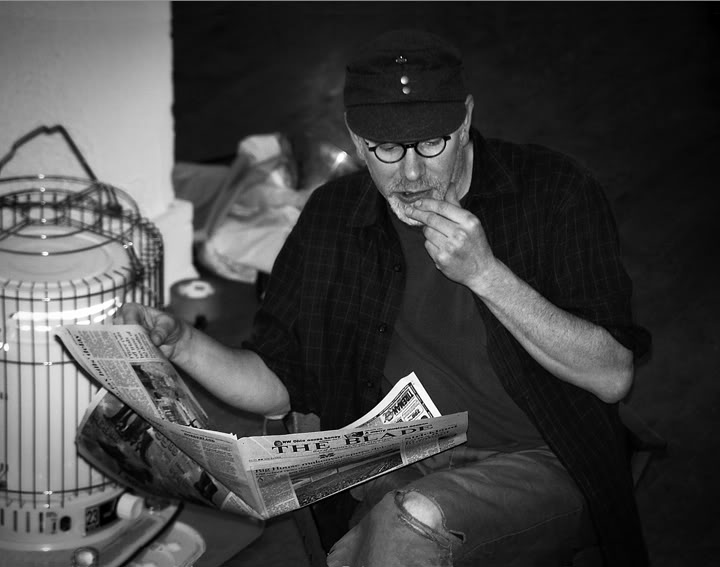
Punk Globe:
When people like Ian Mackaye and Henry
Rollins tell the Teen Idles/
beginning of Dischord story, it always
sounds like you guys, as a bunch of kids around my age, started a scene
out of nothing. Is that entirely true? What about Bad Brains, was there
an audience for them before you started going to shows?
Jeff Nelson: DC had
a rock scene, and a bluegrass scene, and a folk scene, and a small New
Wave/Punk scene when we first got into punk music. The
Bad Brains were
a tiny bit older, and along with a couple other bands, they started
playing New Wave and Punk stuff perhaps one or
one-and-a-half years before we did.
I would say we were definitely influenced by some of the bands around
town, but more so by early New Wave/Punk records we bought or heard on
the one good college radio station. We certainly looked up to the
Bad
Brains, and they were definitely responsible in large part for our band
at the time (The Teen Idles) speeding up all our songs.
Punk Globe: I'll run into an old school punk from the
other side of the Beltway at a Baltimore show every now and then.
They'll say "Ian was a jerk to my friend," or "Guy from Fugazi's a real
quiet type." What's a story some random punk might have about you?
Jeff Nelson: I don't
know. I think you'd have to find some random punk and ask him!
Punk Globe: Did you ever think that your music would
mean so much to a bunch of kids twenty odd years later?
Jeff Nelson: No.
It's very flattering and weird, that music (primarily Minor Threat) we
made years ago is still considered relevant and of interest to people
now.
I do think we were a good band, but there was no shortage of other
bands that worked just as hard,
so I feel very fortunate to be among
the early punk/hardcore bands that somehow percolated up to the top of
"old school" bands people still harken back to.
Punk Globe: Are there any of your bands that you wish
had more of an audience like Three or Skewbald?
Jeff Nelson: I think
Three (the band I was in from 1986-1988, with three members of Gray
Matter)
could have been a really good band if we hadn't broken up. I'm not
terribly happy with our LP, as I think many of the songs are played
too fast (primarily my fault) and the production is rather shrill. I
like the demos of unfinished songs that we tacked onto the CD version.
My next band, The High-Back Chairs, was a very pop-oriented band, very
different from most of the other bands I?d been in. I believed pretty
strongly in
the band back then, but when I listen to most of it
now I
find it a bit busy and sappy at points.
Punk Globe: The Egg Hunt single is a really
interesting
piece, how did you guys wind up in the UK and were there intentions of
turning Egg Hunt into a performing band?
Jeff Nelson: Ian and
I went over to London in 1986 for a business meeting with our friend
John Loder, who ran Southern Studios. We'd been working with him for
three
years at that point, and would continue to work with him until his
untimely death a couple years ago. We all thought it'd be fun to record
some stuff while over there, we liked the results so much that we
decided to put them out as a 7." We'd played one of the songs ("Me and
You") together in the basement several times, and the other song ("We
All Fall Down") was brand new. We later made an attempt to see if we
could turn
Egg Hunt into an actual band, and played once or twice with
Geoff Turner and Steve Niles from Gray Matter, who had broken up
recently. It didn't really work out, so Egg Hunt ended up being the
last joint musical project between Ian and myself. I really liked
playing with Geoff and Steve and we really got along well, though, so
we ended up forming a band, eventually named Three.
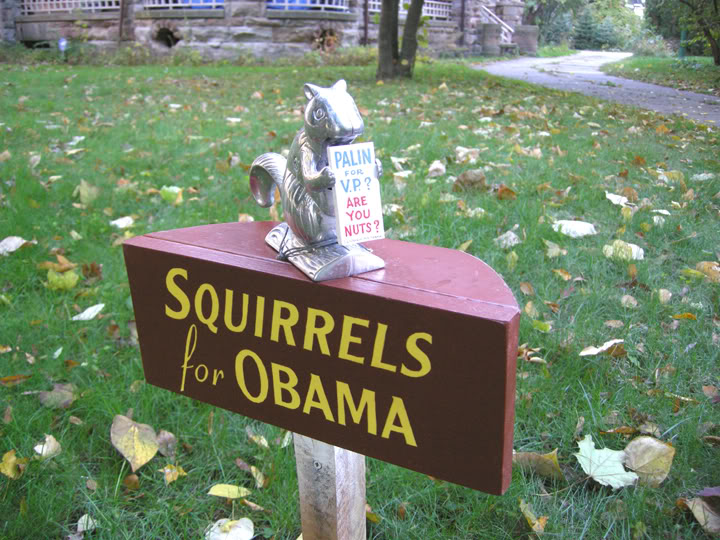
Punk Globe:
My best friend bought
me the new pressing of
First Two 7"s on a 12" not too long ago. Dischord and other labels have
been re-
releasing albums on vinyl, do you think that the resurgence of
vinyl LPs is a fad, or here to stay?
Jeff Nelson: I guess
I tend to think that vinyl will be around as long as I'm alive, but I
think it will always be a niche market. It's just too much work,
getting up to flip over a record, compared to CDs or an iPod full of
songs.
Punk Globe: Do you think that rebellion is something one
can mature out of, or do you and your friends maintain a "punk"
attitude?
Jeff Nelson: I would
say that much of the rebellion I felt and was part of was age-related,
and was something I grew out of (no longer desiring attention garnered
through aggression, for instance). But I am still interested in
counter-cultural stuff, and think that my upbringing (liberal parents,
early life spent abroad) combined with my years in the punk community
continues to have a good effect on me, in not always accepting things
at face value and not always conforming to the majority of society.
Punk Globe: If you were a teenager today and had to do
The Teen Idles, Dischord, and Minor Threat all over again from the
bottom up, would you?
Jeff Nelson: Absolutely!
Although it'd be quite a different experience to do it all now, as the
music world, the music business, the cultural scene, and methods of
communication have changed radically in the last twenty-eight years.
Context is
everything.
Punk Globe: Jeff thank you so much for doing this
interview and for showing me and other kids throughout the years that
teenagers can make an impact on music without being rock gods. On
behalf of Punk Globe
we wish you well. Any final comments?
Jeff Nelson: Thanks
for wanting to interview me. I guess I'd just say if you want to play
music, or be part of the creative arts, or if you want to help promote
others' work that you think is great, then just start doing it! There's
no better way to learn than by doing.



